It seems we can’t find what you’re looking for. Perhaps searching can help.
Sign Up for newsletter!
Subscribe to get the latest eBook!
Hotline






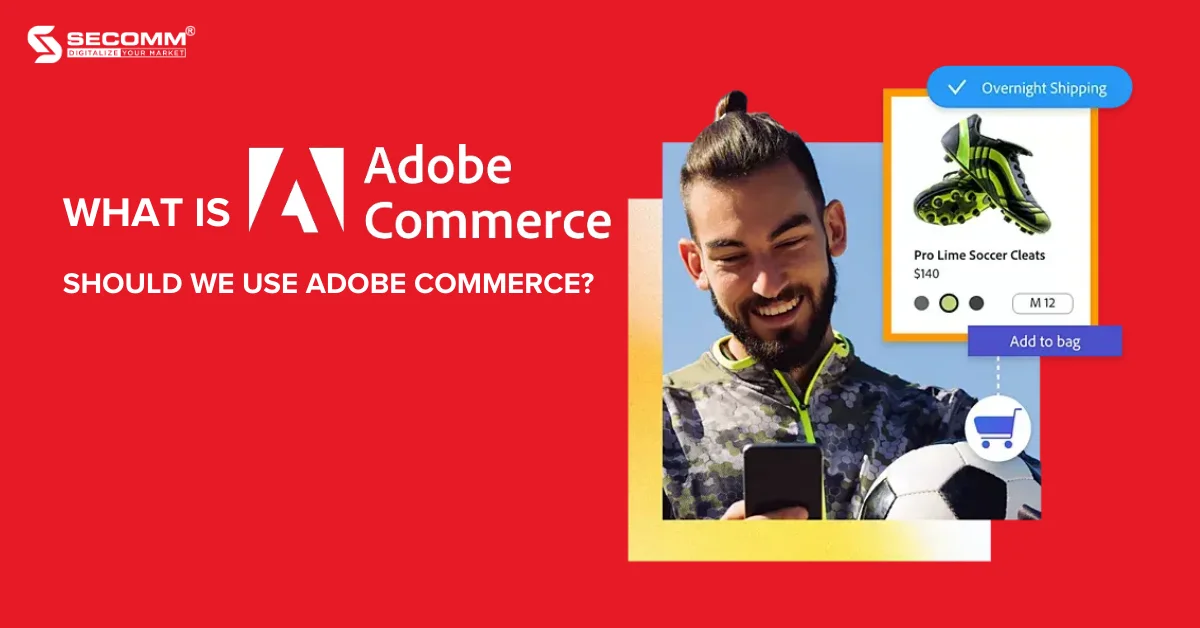
According to Adobe’s report in January 2023, there are more than 100,000 websites built using Adobe Commerce. Among them, over 50,000 websites are actively running, and more than 50,000 websites are in the deployment phase. This is an extremely impressive number for a platform specialized in supporting large enterprises like Adobe Commerce.
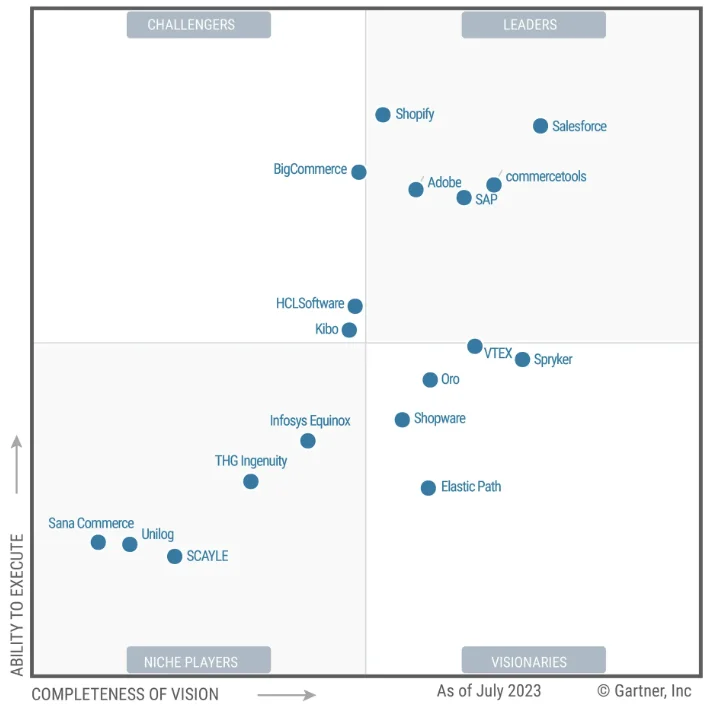
In 2023, Adobe Commerce was recognized by Gartner for its outstanding achievement, ranking first in the list of leading platforms in digital commerce for seven consecutive years.
Adobe Commerce is an open-source eCommerce platform designed specifically for businesses ranging from medium to very large scale, offering high customization and scalability.
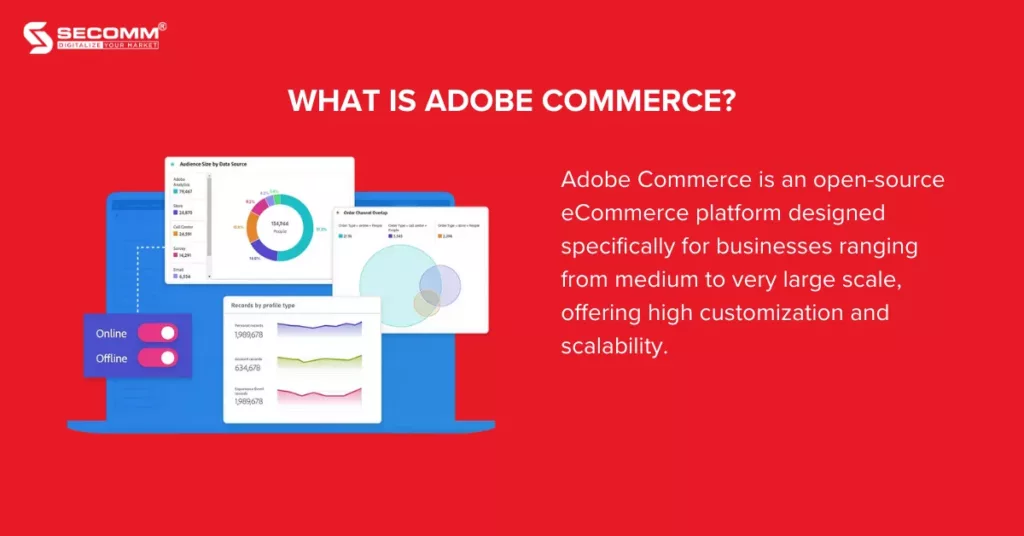
Formerly known as Magento Commerce, it was founded in 2007 by Roy Rubin and Yoav Kutner in Culver City, California, USA. After several changes of ownership, in 2018, Adobe acquired Magento for $1.68 billion and rebranded it as Adobe Commerce. Currently, Adobe Commerce is part of the Adobe Experience Cloud, a product and service suite helping businesses create, manage, and distribute digital experiences.
Adobe Commerce has two main versions: Adobe Commerce Cloud and Magento Open Source.
Adobe Commerce Cloud is a paid version, deployed and managed on the cloud by Adobe. It is divided into two types: on-premise, allowing businesses to be self-sufficient in hosting, and on-cloud, providing hosting at a specific cost.

Magento Open Source is a free version that can be downloaded and used by anyone. It provides essential functionalities for creating and managing online stores.
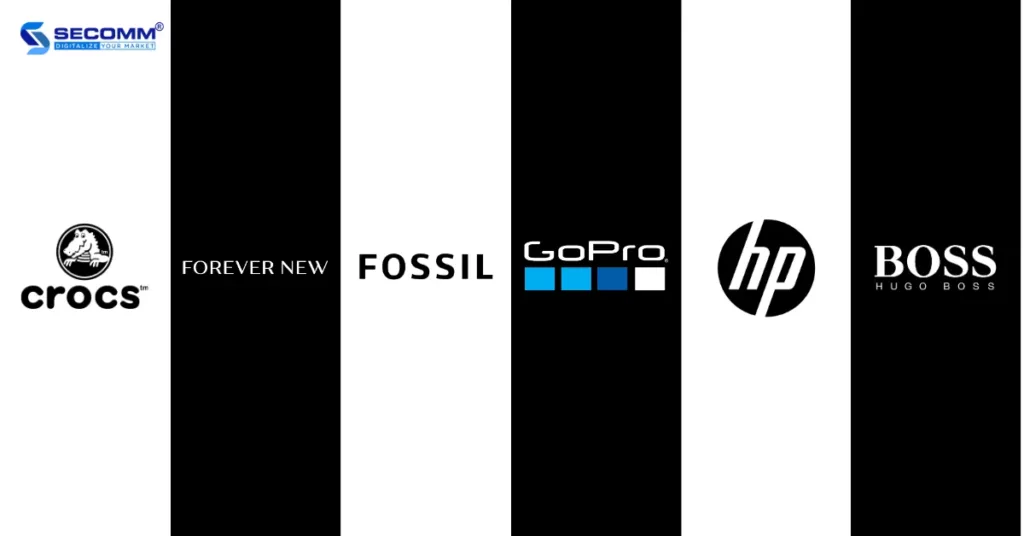
In addition, Adobe offers several additional versions of Adobe Commerce:
The cost of using Adobe Commerce depends on the version being used.
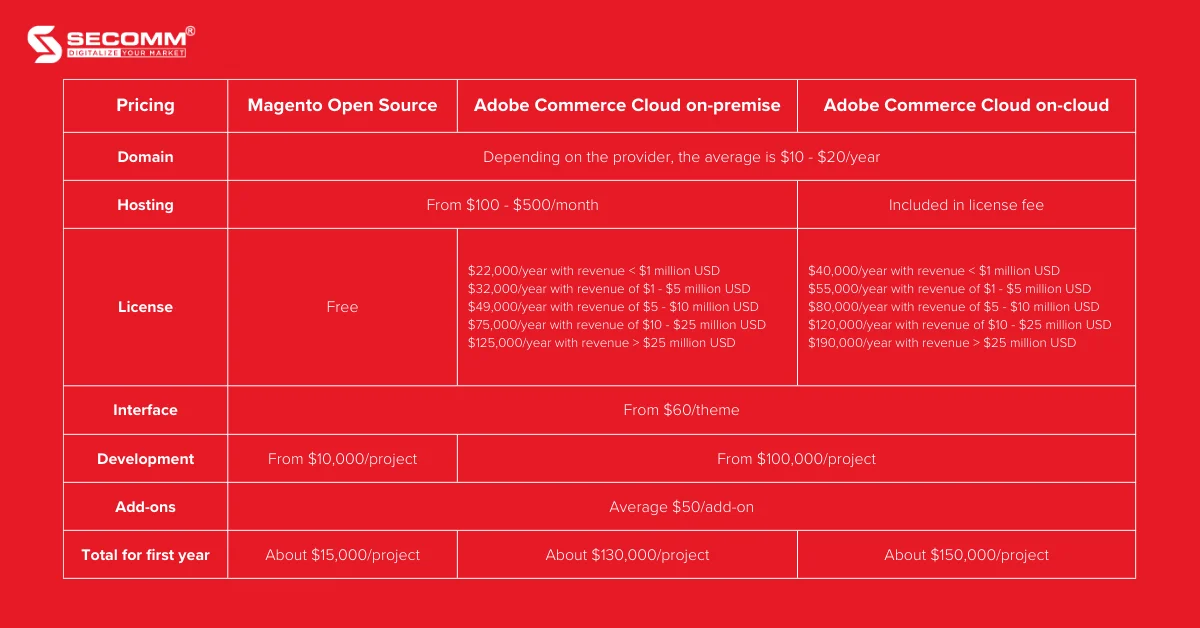
For Adobe Commerce Cloud (On-Cloud): Adobe provides hosting and operates Adobe Commerce on its cloud. License costs for Adobe Commerce on-cloud range from $40,000 to $190,000 per year, depending on the system’s complexity, scale, and business requirements.
For Adobe Commerce Cloud (On-Premise): Businesses need to purchase licenses and install the software on their servers. License costs for Adobe Commerce on-premise range from $22,000 to $125,000 per year, depending on system complexity, scale, and business needs.
For Magento Open Source: Magento provides a free license, and the overall cost is generally more reasonable compared to the two solutions above. However, the available built-in functionalities are limited, and additional investments are required for feature development and integration with third-party services.
In addition to license costs, businesses also need to invest in interface design, development costs, extension utility costs, and employee salaries.
Note: The cost of using Adobe Commerce can be significantly influenced by factors such as business scale, feature requirements, integration needs, and customization requirements.
Read more: Shopify Plus vs Adobe Commerce: Key differences 2023
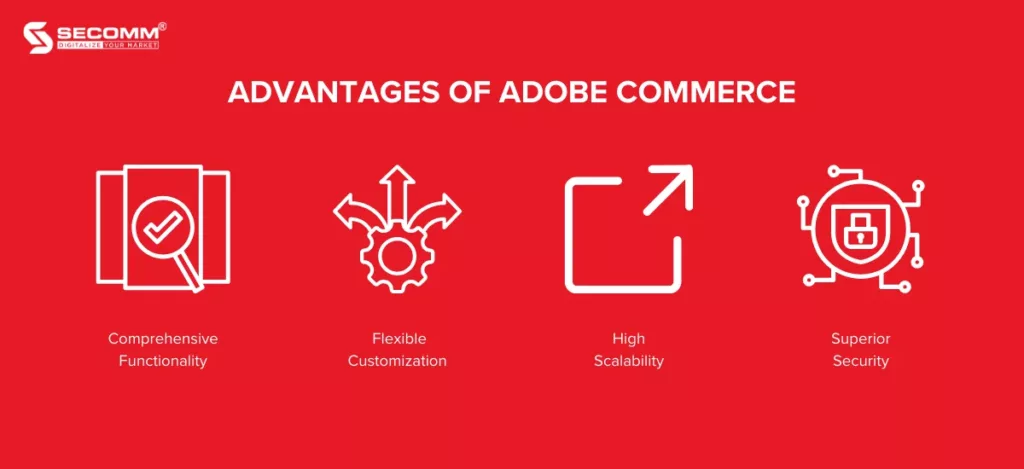
Adobe Commerce is a powerful eCommerce platform, providing all the essential features for building and managing a comprehensive eCommerce website. From product portfolio management, content creation, and conducting transactions, to marketing campaigns and customer management, Adobe Commerce is equipped with all the necessary tools.
In addition to basic features, Adobe Commerce offers many extensions with advanced functionalities.
One of the significant strengths of Adobe Commerce is its globally experienced support community, consisting of professional developers who assist in finding and solving any technical challenges or customizations needed for businesses. This creates favourable conditions to meet every requirement and goal of the business’s eCommerce.
Adobe Commerce possesses all the advantages of an open-source platform with flexible customization capabilities. Especially with ownership and control over the entire source code, businesses can easily customize code sections within the system, easily update, or even develop new features based on specific business needs.
In addition to customization capabilities, Adobe Commerce has excellent scalability for websites. Adobe Commerce allows businesses to expand from one website to multiple websites, one store to multiple stores while still managing everything on the same system. Additionally, Adobe Commerce supports multilingual and multi-currency conversions, helping businesses expand globally.
High-security capability is also a standout advantage of Adobe Commerce with regular system monitoring, proposed security solutions, enhanced security for administrators, and the ability to prevent bots or unauthorized malicious code. This platform helps businesses minimize potential risks from data systems and transaction processes on the system
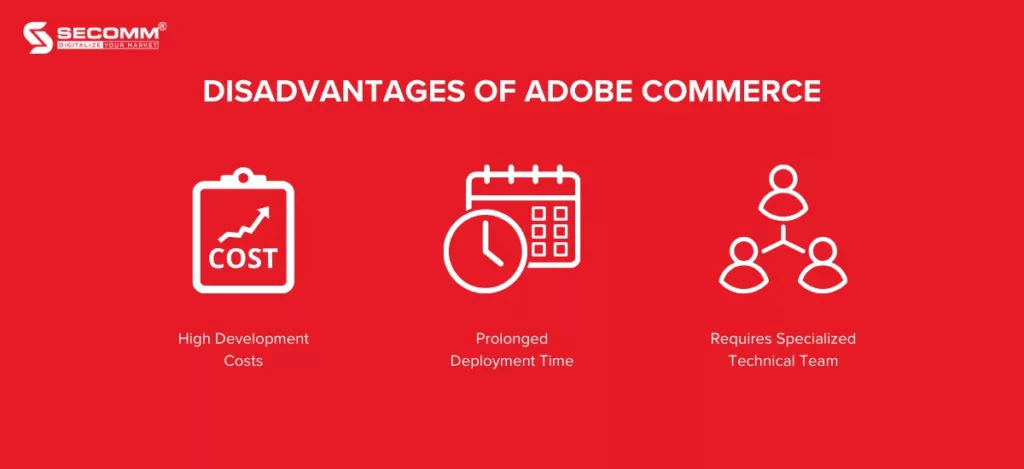
Due to its numerous outstanding features in functionality, customization capabilities, scalability, and high security, the cost of owning an Adobe Commerce website is inevitably high. As estimated earlier, websites developed on the Adobe Commerce platform often have higher costs compared to other platforms, ranging from $10,000 to $300,000 depending on the system’s complexity.
A complete Adobe Commerce project requires a deployment time ranging from 3 months to 1 year. This extended duration slows down the digital transformation process of businesses, making it challenging for them to keep up with the pace of development among competitors and stay updated with market trends.
To build and operate an in-depth eCommerce website system tailored to the specific characteristics of each product and industry with high performance, businesses require a specialized technical team with in-depth expertise. This is particularly crucial for complex Adobe Commerce projects, demanding a high level of technical specialization and experience on the Adobe Commerce platform.
As one of the world’s most renowned sportswear brands, Nike aimed to adopt a personalized eCommerce approach with a focus on mobile device experience. Hence, Nike chose Adobe Commerce to enhance its functionality, concentrating on user experience, increasing interaction, and optimizing images and CTA buttons for smaller screens.

Additionally, customizing and optimizing the eCommerce website-building method through the Headless Commerce API architecture contributed to Nike’s success, turning the brand into a market leader and gaining more market share than its competing counterparts.
Canon, a multinational corporation based in Japan specializing in manufacturing cameras, printers, optical equipment, digital imaging devices, and office equipment, needed to build an eCommerce website to meet digital transformation needs after a long period of traditional business. Canon decided to select Adobe Commerce to deploy a comprehensive eCommerce solution.

“The Commerce and Experience Manager tech stack helps us compress projects that previously took months of development time into just weeks. We can do so much more than before — if we’re developing a new component and trying to get it out within a couple of weeks, we can do that now” — Michael Lebron, Senior Director and Head of Front Office Applications
Annam Gourmet is a premium food and beverage retail brand in Vietnam established in 2001 by a French-Vietnamese couple. Although Annam Gourmet had an online presence before, it was mainly used to develop the brand, and the effectiveness of eCommerce was not emphasized. Annam Group, the parent company of Annam Gourmet, along with partner SECOMM, chose to use Magento 2 to build an eCommerce website.
Currently, Annam Gourmet’s Magento 2 website has officially launched, operating stably and effectively, helping the business successfully transform in the eCommerce market. Besides the Annam Gourmet project, Magento is also chosen by the Annam Group for other retail eCommerce systems within the group, such as The Warehouse (wine retail) and Nespresso.

In general, Adobe Commerce is a suitable eCommerce platform for businesses of all sizes, from startups and SMEs to large corporations. However, issues related to budget, time, and specialized teams have made many small and medium-sized enterprises hesitate to use Adobe Commerce for deploying eCommerce websites. Therefore, Adobe Commerce is often invested in by large enterprises to build in-depth eCommerce systems.
With profound experience and the development of numerous complex eCommerce systems on Adobe Commerce, such as Laybyland (Australia, the US, New Zealand), Jasnor (Australia, New Zealand), and The Warehouse (Vietnam), SECOMM understands the challenges in the platform selection and eCommerce deployment that businesses are facing.
Contact SECOMM today or call directly at the hotline (028 7108 9908) for a free consultation on deploying Adobe Commerce for your brand.
 2
2
 9,596
9,596
 0
0
 2
2Subscribe to get the latest eBook!
Hotline